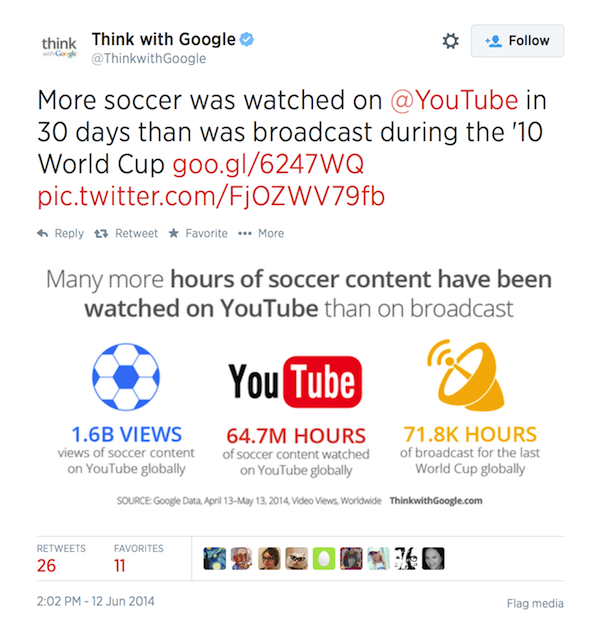Marketing has had, historically, a bad rap for being — how do I say this diplomatically? — creative with the truth. Not necessarily lying outright, although that’s certainly happened. But often deliberately choosing words — as well as choosing what to omit — so as to lead people to slightly or wholly inaccurate conclusions that favor the marketer.
One of the things I love about where marketing is headed today is that leading marketers are moving away from parlor tricks to providing genuinely valuable content and great customer experiences. Great marketing is becoming recognized as being about trust and utility.
If you were going to name one company, more than any other, that helped usher in this new era of marketing it was Google — search has been a truly powerful force for transparency in marketing.
Which is why it pains me to see Google promoting this on Twitter:

I get it — Google wants to draft on the popularity of the World Cup to illustrate how we’re moving from a world of broadcast TV to a world of on-demand services like YouTube. There is a powerful point to be made there. But the way they’re doing that here is a blatant old-school, misdirection marketing tactic.
Conceptually, they’re engaging in a sleight-of-hand comparison, presenting the number of hours of soccer viewed on YouTube (actual individuals watching those hours) up against the number of hours of the last World Cup that were broadcast on TV.
And then saying, “Hey, everybody, look — YouTube’s hours are larger!”
Just to be crystal clear: each one of those broadcast hours was likely viewed by millions watching it on TV. In fact, according to the data available through Wikipedia, “the cumulative audience of all matches of the 2006 FIFA World Cup was estimated to be 26.29 billion with an estimated 715.1 million people watching the final match.”
Now, maybe you’re inclined to give them the benefit of the doubt — that their intention was to simply show the scope of these two numbers (hours viewed vs. hours broadcast) as two independent pieces of data, only anecdotally related. But then the headline in their image blatantly claims:
Many more hours of soccer content have been watched on YouTube than on broadcast
That’s. Just. Not. True.
I know, I shouldn’t get worked up about this. Certainly far worse sins out there in the marketing world. It’s just that Google has been one of my heroes with the way they’ve helped champion a new brand of marketing, and I hate to see them sully themselves with trumped up bragging rights for YouTube.
Come on. We all know YouTube is gigantic and is fundamentally changing the world. It’s not worth tarnishing your reputation to artificially inflate the already legitimately humongous.
You’re better than that, Google.



